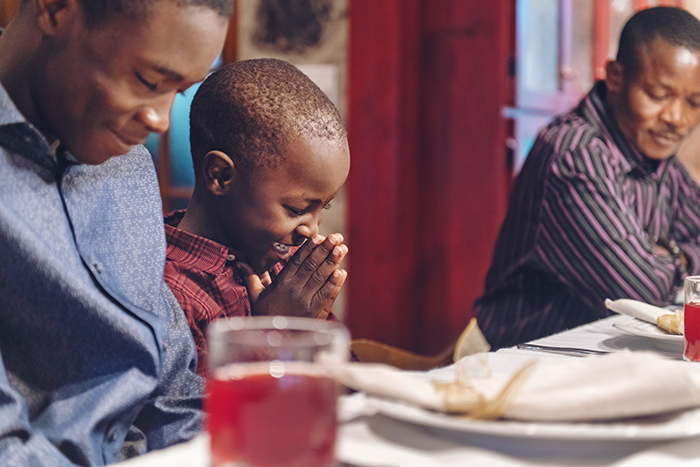
Food for the Soul

“…herein lie buried many things which if read with patience may show the strange meaning of being black here in the dawning of the [Twenty-First] Century. This meaning is not without interest to you, gentle reader; for the problem of the [Twenty-First] Century is the problem of the color line.”
—W.E.B. DuBois, The Souls of Black Folk
RELATED: How to host a safe holiday meal during coronavirus
Thanksgiving has arrived and that can only mean one thing. African Americans across the nation are about to enjoy some delectable soul food. A colleague from seminary asked me a seemingly simple question one day: What is the soul? To really understand my struggle with this query you have to appreciate my background. While attending a majority white seminary, it’s safe to say that I had a bit more melanin than some others. My flesh tone was a hue that resembled many from our historical past who were considered African Americans or Negroes.
He asked a question that evoked thoughts of pride as I pondered my godly heritage. Soul (at least from my perspective) was inextricably interwoven in my DNA. Soul music from the Harlem Renaissance resounded within as I began to recount the great jazz artists of the time (ranging from Cab Calloway to Duke Ellington). I thought of the great James Brown, who is deemed the “Godfather of Soul.” If anybody knew soul, it was my people. And soul in the African American community wasn’t just limited to melodic harmony and sound. Soul had a significant role in food preparation. Soul food, as we know it in this country, originated in the African American community. This delectable culinary genre included a wide range of items including, but not limited to, collard greens, ham hocks, pig’s feet, pork neck bone, fat back, and chitterlings a.k.a. pig intestines. (If that last sentence didn’t make you hungry, please check your pulse.)
During an oppressive era beginning in the late 17th century, slaves were afforded the “opportunity” to have the leftover pig parts from their masters’ tables. This normally included the parts the slave masters felt were unfit for human consumption. The slaves took them, carefully cleaned them, salted them up to make them flavorful, and served them to their families. As a result, soul food became a staple in the African American slave community.
So an inquiry about my soul transposed the generally perceived idea of soul in society (and the Christian community generally). It involved retained customs and traditions that accompanied thousands on an infamous Trans-Atlantic journey hundreds of years ago. When my colleague asked that question about my soul, many images, tastes, and sounds came to mind.
“One ever feels his twoness, — an American, a Negro; two souls, two thoughts, two unreconciled strivings; two warring ideals in one dark body, whose dogged strength alone keeps it from being torn asunder.” —W.E.B. DuBois, The Souls of Black Folk
Despite those elicited proud images of soul defined in my own experience, I can appreciate DuBois’ “twoness.” I live it out every day. There is a soul dualism that perpetuates itself. I am both an American and a Negro. For many, this is a comfortable idea. However, in reality this duality presents two warring ideals that have a profound impact on the way I live my life. Even in a seminary, where a majority of the books read were by white, middle-aged men, this duality impacted my experience. I’m quite sure this twoness had some role in issues presented in the “Jena Six” and Trayvon Martin stories. Both painted portraits of cities that still have some “color line” issues. When a group of black boys respond violently to a “noose” incident in a schoolyard, how could one not surmise that color line issues are still prevalent in society? When distrust of a local Central Florida Police Department mobilizes thousands of African American, how could we question the existence of the color line?
As I sat on the seminary campus and reflected, I realized that it was this twoness that led me there. I figured out that it wasn’t enough to say that I casually associate with people outside of my own ethnic group. Instead, I wanted to be able to experience community, fellowship, and dialogue with people who did not share my ethnic background. As I walked from class one week, I stopped to have a conversation with one of my classmates. We spoke about diversity and its real meaning for our seminary (and the Church generally). We both explained frustrations with tossing around diversity labels without authenticity. During our conversation, I had to apologize for assuming that he understood what I was talking about when I mentioned the acronym HBCU (Historically Black College and University) or when I spoke freely about tendencies in black church leadership.
Ultimately our conversation reassured me that there are others who wrestle with duality of the soul (whether a white Christian trying to genuinely understand other cultures or a minority Christian doing the same). I have learned that some people want to be able to function in that “twoness” to better understand others outside of their culture. Isn’t the body of Christ called to this kind of unity and understanding? Will we stand by idly as the color line widens? If the Church isn’t called to unite how can we expect it from a fallen world?
So as I lay into some Soul Food this holiday season, I remain grateful. I am grateful for the African American story. I am appreciative that my life is being grafted into a story of struggle and triumph. But the soul “twoness” is ever present. Reminding me that our story as a people is tied into God’s greater story of redemption. And for that I am thankful. Now pass me those collard greens.
